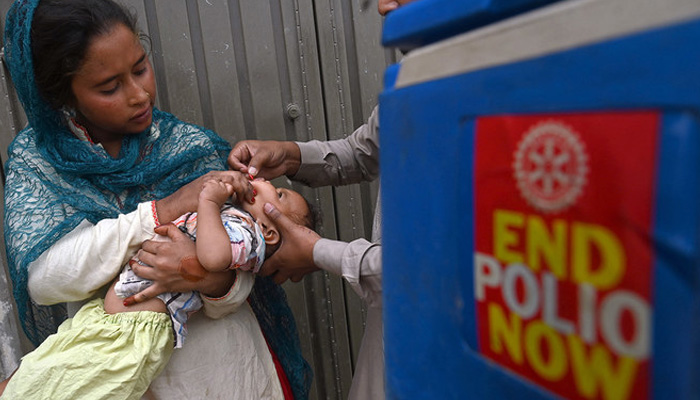International committee raises alarm about polio outbreak in Pakistan
ISLAMABAD: The Emergency Committee under the International Health Regulations (2005) on the international spread of poliovirus has said that Pakistan’s polio eradication program continues to miss a large number of children.
The emergency committee meeting which was convened by the WHO Director-General on August 16, 2023 has issued its statement highlighting the gaps in polio eradication efforts in Pakistan and Afghanistan, observing that recent positive environmental samples in Peshawar and Karachi underline that the risk of an outbreak continues in Pakistan.
The committee noted that there has been one new case of WPV1 in Pakistan since the last meeting, bringing the tally to two in 2023, adding that both cases occurred in Bannu district in Khyber Pakhtunkhwa (KP) province. There have been 15 environmental surveillance positive samples in 2023.
“Although the action plan in southern KP has resulted in 160,000 more children being vaccinated, the context remains challenging - including political instability, insecurity in some areas with front line workers requiring police patrols to accompany them and vaccination boycotts, where communities make demands for other services in exchange for allowing polio vaccination,” the committee further said.
In Afghanistan, since the last meeting, there have been five new WPV1 cases reported, all from Nangarhar province, the emergency committee said adding that the cases occurred in five different districts and had onsets from April to May 2023.
“Any setback in Afghanistan poses a risk to the programme in Pakistan due to high population movement,” the emergency committee warned.
The committee further observed that in 2023, there are only two genetic clusters of WPV1 identified, compared to three in 2022 and five in 2021. However, there have been multiple chains of transmission within these two genetic clusters, detected primarily in the endemic zones of Eastern Afghanistan and South KP of Pakistan, including an extreme orphan virus, indicating some gaps in surveillance.
The emergency committee warned that due to the ongoing transmission in eastern Afghanistan with cross border spread into Pakistan and the large pool of unvaccinated zero dose children in southern Afghanistan constitutes an ongoing risk of WPV1 re-introduction into the southern region.
Commenting on the emergency committee’s statement, Pakistan’s caretaker health minister Dr Nadeem Jan told The News that boosting routine immunization and coverage of zero dose via outreach campaigns would help in polio eradication efforts in the country.
“Starting Monday, we are in to a targeted, integrated campaign. Hopes are high that by December 2023, the endogenous circulation of WPV1 will be arrested,” he said.
-
 Maxwell Seeks To Block Further Release Of Epstein Files, Calls Law ‘unconstitutional’
Maxwell Seeks To Block Further Release Of Epstein Files, Calls Law ‘unconstitutional’ -
 Prince William Issues 'ultimatum' To Queen Camilla As Monarchy Is In 'delicate Phase'
Prince William Issues 'ultimatum' To Queen Camilla As Monarchy Is In 'delicate Phase' -
 Winter Olympics 2026: Remembering The Most Unforgettable, Heartwarming Stories
Winter Olympics 2026: Remembering The Most Unforgettable, Heartwarming Stories -
 King Charles Hands All Of Andrew Mountbatten-Windsor’s Records And Files To Police: Report
King Charles Hands All Of Andrew Mountbatten-Windsor’s Records And Files To Police: Report -
 Eric Dane's Family Shares Heartbreaking Statement After His Death
Eric Dane's Family Shares Heartbreaking Statement After His Death -
 Samsung Brings Perplexity AI To Galaxy S26 With ‘Hey Plex’ Voice Command
Samsung Brings Perplexity AI To Galaxy S26 With ‘Hey Plex’ Voice Command -
 Fergie’s Spent £13,000 A Day Since Andrew’s Troubles Started: Here’s Where She Fled
Fergie’s Spent £13,000 A Day Since Andrew’s Troubles Started: Here’s Where She Fled -
 Eric Dane's Death Becomes Symbol Of ALS Awareness
Eric Dane's Death Becomes Symbol Of ALS Awareness -
 Michael B. Jordan Gives Credit To 'All My Children' For Shaping His Career: 'That Was My Education'
Michael B. Jordan Gives Credit To 'All My Children' For Shaping His Career: 'That Was My Education' -
 Sun Appears Spotless For First Time In Four Years, Scientists Report
Sun Appears Spotless For First Time In Four Years, Scientists Report -
 Bella Hadid Opens Up About 'invisible Illness'
Bella Hadid Opens Up About 'invisible Illness' -
 Lawyer Of Epstein Victims Speaks Out Directly To King Charles, Prince William, Kate Middleton
Lawyer Of Epstein Victims Speaks Out Directly To King Charles, Prince William, Kate Middleton -
 Microsoft CEO Shares How Gates Doubted $1bn OpenAI Investment
Microsoft CEO Shares How Gates Doubted $1bn OpenAI Investment -
 Milo Ventimiglia Calls Fatherhood 'pretty Wild Experience' As He Expects Second Baby With Wife Jarah Mariano
Milo Ventimiglia Calls Fatherhood 'pretty Wild Experience' As He Expects Second Baby With Wife Jarah Mariano -
 Chinese Scientists Unveil Advanced AI Model To Support Deep-space Exploration
Chinese Scientists Unveil Advanced AI Model To Support Deep-space Exploration -
 Anthropic’s New AI Tool Wipes Billions Off Cybersecurity Stocks
Anthropic’s New AI Tool Wipes Billions Off Cybersecurity Stocks




